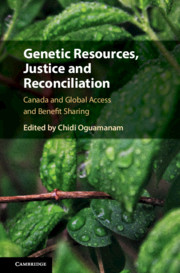Acknowledgements
This edited collection is the product of a multifaceted collaboration, the support of several institutions and many individual acts of goodwill that cannot adequately be acknowledged in the present space. The ABS Canada (www.abs-canada.org) project which birthed this present book owes its life to a Social Sciences and Humanities Research Council of Canada (SSHRC) Insight Grant awarded in 2014. A number of my colleagues, including Professors Ikechi Mgbeoji of Osgoode Hall Law School and Teresa Scassa of the University of Ottawa Faculty of Law, and Frédéric Perron-Welch of the Centre for International Sustainable Development Law at McGill University, are my partners in the grant. Other colleagues, including Professors Jeremy de Beer, Elizabeth Sheehy, Bruce Feldthusen and Helene Dragatsi provided internal project review and administrative support of significant value.
In the years following the awarding of the SSHRC grant, we have been lucky to build on the tremendously resourceful student body at the University of Ottawa, especially our Indigenous students who did serve and continue to primarily serve as trainees in various capacities, including as research assistants, community liaisons and agents of mobilization. They helped not only to advance ABS Canada as an ongoing research network but also in ensuring that we had very healthy and sustainable community outreach and collaboration with Indigenous organizations, leaders and community members that partnered and participated in our field work. We are extremely proud to specifically mention the following as ABS Canada’s Indigenous alumni: Christopher Folz, Jessica Saris, Jay Pelletier and Joel Morales. Other graduate alumni led by our long-suffering and outstanding Project Manager, Chris Koziol, include Katie Degendorfer, Freedom Kai-Philips, Ece Yilmaz, Jeremy Baarbé, Gaëlle Groux, Andrea Lesperance and Vipal Jain, some of whom doubled as members of the Open African Innovation Research (Open AIR) partnership project at the University of Ottawa.
Part of the evolution of our team is our transition into a research network. This was made possible through the generosity of some institutional partners and funders. They include the Open African Innovation Research (Open AIR), the Centre for International Governance Innovation (CIGI) and the Maritime Aboriginal Peoples Council (MAPC); the ABS Focal Point at Environment Canada, the Convention on Biological Diversity and the International Treaty on Plant Genetic Resources for Food and Agriculture and officials from the Government of Canada with whom we crossed paths. Open AIR lent us the goodwill of its network and resource support that enabled us to attend and monitor relevant international fora on ABS. Open AIR also facilitated conversations between Indigenous peoples in Canada and their African counterparts. The CIGI partnered with us consistently, sponsoring the attendance and participation of our team members through the Focus Groups. MAPC remains an enduring partner. It assisted us in building needed trust and in mobilizing its federating members: the Native Council of Nova Scotia, the Native Council of Prince Edward Island and the New Brunswick Aboriginal Peoples Council as well as other Indigenous partners spanning the Algonquin Anishinaabeg territory and Fort William First Nation in Ontario, Treaty 6 territory in Saskatchewan, and the Maliseet and the Mi’kmaq in New Brunswick. And there are many names behind these institutional collaborations. With apologies upfront for those we omit, we thank Roger Hunka, Joshua McNeely and Larry McDermott, Nashina Shariff, Nadine Nickner, Oonagh Fitzgerald and Bassem Awad.
Our project benefited from resourceful expert insights of many distinguished colleagues who served in various capacities including as keynote speakers, facilitators, participants and in other capacities through our field work and outreach. In this regard, we thank Dean Martin Phillipson of the College of Law, University of Saskatchewan, Professors Graham Dutfield of Leeds University, Konstantia Koutouki of the University of Montreal, Indigenous lawyer and ABS expert, Merle Alexander of Gowlings LLP in Vancouver, and Tim Hodges, Professor of Practice in Strategic Approaches to Global Affairs at the Institute for the Study of International Development at McGill University. Tim was a Co-Chair of the Intergovernmental Negotiating Committee of the Nagoya Protocol from the beginning in 2006 to its completion in 2010; Kent Nnadozie, the Secretary of the FAO International Treaty on Plant Genetic Resources for Food and Agriculture, John Scott and Valarie Normand both of the Convention on Biological Diversity.
My personal thanks must also extend to former Dean Nathalie Des Rosiers and her successors, Acting Dean, François Laroque, substantive Dean, Adam Dodek, and the Centre for Law, Technology and Society at the University of Ottawa for offering me the institutional support and accommodation from the Faculty of Law required to undertake the task of mobilizing, growing and leading the research team that has since morphed into the ABS Canada program. Without their consistent understanding, the project could not have been successful. The same is true of my incredible editor and publisher, Matt Galloway and his team at the Cambridge University Press, whose astonishing efficiency and professionalism did not allow for excuses throughout the publication process. Last, but not the least, I sincerely thank all the contributors to this present volume. Their commitment and loyalty as part of the ABS Canada team in various capacities is evident in the research and insights they have shared in this book. For many others, especially my immediate family members, who tolerated and continue to tolerate my unconventional schedules at significant personal sacrifices, I remain grateful. The journey through Genetic Resources, Justice and Reconciliation: Canada and Global Access and Benefit Sharing is one of unbelievable collaboration for which all the seen and unseen hands, all the heard and unheard voices of help and goodwill are hereby acknowledged.



